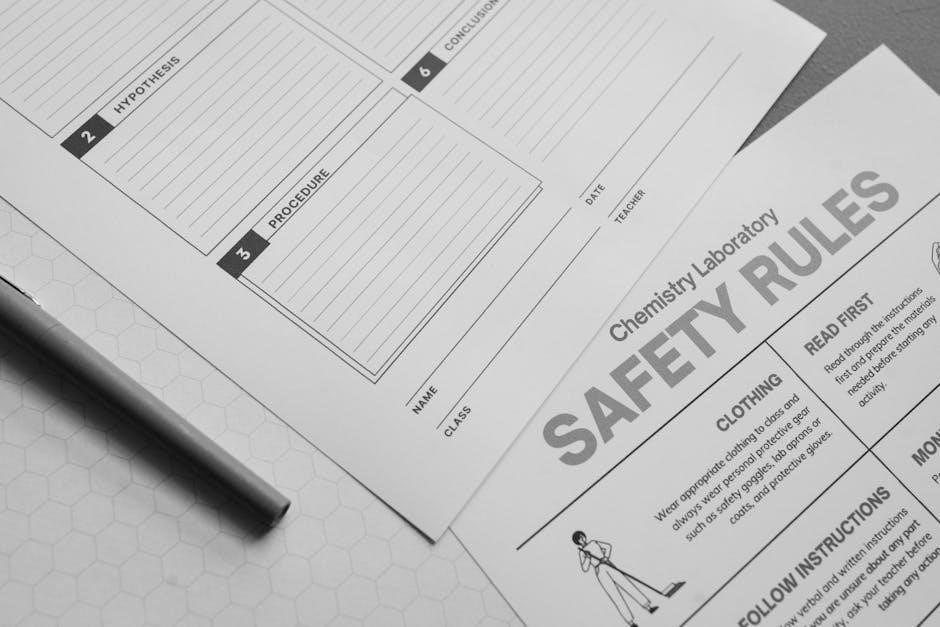The ACS General Chemistry Exam Study Guide is a comprehensive resource designed to help students prepare for the ACS exam, covering key topics and concepts in general chemistry․ It includes detailed explanations, practice questions, and study strategies to ensure success․ Produced by the Division of Chemical Education (DivCHED), this guide is an essential tool for students aiming to excel in their chemistry coursework and examinations․

1․1 Overview of the ACS General Chemistry Exam
The ACS General Chemistry Exam is a standardized test designed to assess students’ understanding of fundamental chemistry concepts․ It consists of 75 multiple-choice questions and has a 110-minute time limit․ The exam covers a wide range of topics, including atomic structure, periodic trends, chemical bonding, stoichiometry, solution chemistry, and thermochemistry․ It is intended to evaluate both conceptual knowledge and problem-solving skills․ The exam is often required for students in ACS-accredited programs and serves as a benchmark for measuring mastery of general chemistry principles․ Preparation is crucial to achieve a high score and demonstrate proficiency in the subject․
1․2 Importance of the Study Guide for Preparation
The ACS General Chemistry Exam Study Guide is the most valuable resource for preparing for the exam․ It provides a comprehensive overview of all exam topics, ensuring students are well-versed in key areas․ The guide includes over 600 practice problems, divided into first-term and second-term material, allowing targeted study․ It helps students identify weak areas, refine problem-solving skills, and build confidence․ Additionally, it offers strategies for time management and test-taking techniques, which are crucial for success․ Regular use of the study guide significantly enhances readiness and performance, making it an essential tool for achieving a high score on the exam․

Exam Format and Structure
The ACS General Chemistry Exam consists of 75 multiple-choice questions, with a 110-minute time limit․ Students must bring a calculator, pencil, and scantron for completion․
2․1 Number of Questions and Time Limit
The ACS General Chemistry Exam features 75 multiple-choice questions, with a 110-minute time limit․
Students are required to answer all questions within this timeframe․
The exam is designed to assess understanding of fundamental chemistry concepts․
Proper time management is crucial to complete the exam successfully․
A calculator, pencil, and scantron are essential materials to bring․
The format ensures a fair evaluation of knowledge and problem-solving skills․
2․2 Types of Questions and Scoring System
The ACS General Chemistry Exam primarily features multiple-choice questions, designed to test understanding and problem-solving skills․
Questions are divided into conceptual and traditional types, with some paired to assess depth of knowledge․
Each correct answer earns 1 point, while incorrect or blank answers receive 0 points․
The scoring system emphasizes accuracy and discourages guessing․
Total scores are calculated based on the number of correct responses․
Understanding the question types and scoring system is crucial for effective exam preparation․

Key Topics Covered in the Exam
The exam covers fundamental topics such as atomic structure, periodic trends, chemical bonding, stoichiometry, solution chemistry, and thermochemistry, ensuring a broad understanding of general chemistry principles․
3․1 Atomic Structure and Periodic Trends
Atomic structure and periodic trends form the foundation of chemical understanding․ The exam covers topics such as electron configurations, periodic table organization, and atomic radius trends․ Students are expected to understand how atomic properties, like electronegativity and ionization energy, vary across periods and groups․ These concepts are essential for predicting chemical behavior and bonding patterns․ Mastery of these areas is critical for solving problems related to chemical reactions and elemental properties, ensuring a strong grasp of general chemistry principles․
3․2 Chemical Bonding and Stoichiometry
Chemical bonding and stoichiometry are central to understanding chemical interactions and reactions․ The exam emphasizes the principles of ionic and covalent bonding, including Lewis structures and molecular geometry․ Stoichiometry topics include molar ratios, limiting reagents, and percent yield calculations․ These concepts are crucial for balancing equations and predicting reaction outcomes․ Additionally, the guide explores real-world applications of these principles, reinforcing their importance in laboratory and industrial chemistry․ Mastery of these topics is essential for solving quantitative problems and understanding the foundational chemistry of reactions and compounds․
3․3 Solution Chemistry and Thermochemistry
Solution chemistry and thermochemistry are vital areas of study in the ACS General Chemistry Exam․ Solution chemistry focuses on solubility, concentration calculations, and colligative properties, while thermochemistry explores heat changes in chemical reactions, including enthalpy, calorimetry, and thermodynamic laws․ These concepts are crucial for understanding reaction spontaneity and energy transformations․ The study guide provides detailed explanations and practice problems to master these topics, ensuring students can apply them to real-world scenarios and exam questions effectively․ These principles are foundational for advanced chemistry studies and practical laboratory applications․

Study Resources and Materials
The ACS General Chemistry Study Guide offers comprehensive preparation materials․ Key resources include practice exams, recommended textbooks, and online platforms for supplemental learning and review․
4․1 The Official ACS General Chemistry Study Guide
The official ACS General Chemistry Study Guide is a 201-page resource packed with over 600 practice problems․ It is divided into first-term and second-term materials, covering foundational topics like atomic structure, chemical bonding, and stoichiometry․ This guide provides detailed explanations and sample questions to help students gauge their understanding․ Additionally, it includes concepts from solution chemistry and thermochemistry, ensuring a thorough preparation for the exam․ The guide is a must-have for students aiming to excel in the ACS General Chemistry Exam, offering structured learning and practice opportunities․
4․2 Practice Exams and Past Papers
Practice exams and past papers are invaluable tools for ACS General Chemistry Exam preparation․ They provide students with hands-on experience, mirroring the actual exam format and content․ The official study guide includes numerous practice questions, while past papers offer insights into recurring topics and question types․ Solving these materials helps students identify weak areas, improve time management, and build confidence․ Regularly practicing with these resources ensures familiarity with the exam structure and enhances problem-solving skills, making them indispensable for achieving success on the ACS General Chemistry Exam․
4․3 Recommended Textbooks and Online Resources
Several textbooks and online resources complement the ACS General Chemistry Study Guide, offering in-depth coverage of exam topics․ Popular textbooks include Chemistry: The Central Science and Chemical Principles, which provide detailed explanations and practice problems․ Online platforms like Khan Academy, Coursera, and OpenStax offer free or low-cost materials, including video tutorials and interactive exercises․ Additionally, resources like Chem Libre and HyperPhysics provide comprehensive reviews of key concepts․ These resources are designed to support students in mastering the subject matter and preparing effectively for the ACS General Chemistry Exam․
Preparation Strategies
Effective preparation involves consistent review, active learning techniques, and utilizing the official study guide․ Regular practice with sample questions and joining study groups enhance understanding and retention․
5․1 Understanding Key Concepts
Mastering fundamental principles is crucial for success․ Focus on atomic structure, periodic trends, and chemical bonding to build a strong foundation․ Regularly review stoichiometry and thermochemistry concepts, as they are heavily tested․ Use the official study guide to clarify complex topics and ensure comprehension; Prioritize understanding over memorization to tackle both conceptual and traditional questions effectively․ This approach enhances problem-solving skills and boosts confidence for the exam․
5․2 Creating a Study Schedule
Develop a structured study plan to cover all exam topics systematically․ Allocate specific time slots for reviewing atomic structure, chemical bonding, stoichiometry, and thermochemistry․ Divide your study sessions into manageable chunks, focusing on one or two topics per day․ Incorporate regular breaks to maintain focus and retention․ Use the official study guide to track progress and identify weak areas․ Prioritize challenging subjects and dedicate extra time to mastering them․ Include practice exams in your schedule to simulate test conditions and assess readiness․ Adjust your plan as needed to ensure comprehensive preparation and confidence building․
5․3 Practicing with Sample Questions
Practicing with sample questions is crucial for exam success․ Use the official ACS study guide and past papers to familiarize yourself with the exam format and question types․ Start with untimed practice to understand concepts, then progress to timed sessions to simulate test conditions․ Focus on identifying weak areas and improving problem-solving skills․ Review explanations for both correct and incorrect answers to deepen understanding․ Regular practice helps build confidence and reduces exam anxiety․ Prioritize questions covering key topics like atomic structure, chemical bonding, and stoichiometry․ Consistent practice ensures readiness for the actual exam․

Exam Day Tips and Tricks
Arrive early, stay calm, and manage your time wisely․ Use the scantron correctly, allocate time for each question, and review your answers before submitting․ Bring necessary materials like a calculator and pencils․ Stay focused and avoid distractions to ensure optimal performance․
6․1 Managing Time Effectively

Effective time management is crucial for success on the ACS General Chemistry Exam․ With 75 questions and a 110-minute limit, allocate approximately 1․5 minutes per question․ Skim through the exam to identify easier questions first, ensuring you answer all accessible ones within the allotted time․ Leave complex questions for later to avoid wasting time․ Use the remaining minutes to review your answers and make necessary corrections․ Staying calm and focused will help you maximize your performance and ensure you complete the exam efficiently․
6․2 Reducing Stress and Anxiety
Reducing stress and anxiety is essential for optimal performance on the ACS General Chemistry Exam․ Practice relaxation techniques like deep breathing or positive visualization to stay calm․ Familiarize yourself with the exam format and content to build confidence․ Avoid cramming by maintaining a consistent study schedule․ Stay hydrated, eat well, and ensure adequate sleep before the exam․ Remind yourself that it’s okay to feel nervous—stress is natural, but managing it through preparation and mindfulness will help you perform your best․

Common Mistakes to Avoid
Common mistakes include rushing through questions, misreading stems, and calculation errors․ Thoroughly review concepts, practice consistently, and ensure understanding of question types to minimize errors․
7․1 Misunderstanding Question Types
Misunderstanding question types is a common pitfall․ The ACS exam includes multiple-choice questions, paired conceptual and traditional items, and calculation-based problems․ Students often confuse paired questions, leading to incorrect answers․ Additionally, misinterpreting question stems or failing to identify distractors can result in errors․ It is crucial to thoroughly review question formats in the study guide and practice past papers to familiarize oneself with the exam structure․ Understanding each question type helps in allocating time effectively and reducing mistakes during the actual test․ Proper preparation and attention to detail are key to avoiding this issue․
7․2 Time Management Errors
Time management errors are a frequent issue during the ACS General Chemistry Exam․ With 75 questions and a 110-minute limit, students often spend too much time on complex problems, leaving insufficient time for simpler ones․ Additionally, some candidates fail to allocate time for reviewing answers, leading to unchecked mistakes․ Practicing with past papers and adhering to a strict timing schedule during study sessions can help mitigate this issue․ Effective time management is crucial for ensuring all questions are attempted and reviewed, maximizing the chances of a high score․ Proper preparation and strategy are essential to avoid this common mistake․

Final Review and Assessment
The final review involves summarizing key concepts and using self-assessment tools to evaluate readiness․ Practice exams and past papers help identify weaknesses, ensuring thorough preparation for the exam․
8․1 Summarizing Key Points
Summarizing key points is crucial for effective exam preparation․ The study guide provides a concise review of fundamental concepts, such as atomic structure, periodic trends, and stoichiometry․ It also covers solution chemistry and thermochemistry, ensuring a strong foundation․ Organized into first-term and second-term materials, the guide helps students identify essential equations and theories․ By focusing on high-yield topics, learners can streamline their review process․ This approach enables them to reinforce understanding and address weak areas, ultimately building confidence for the ACS General Chemistry Exam․
8․2 Self-Assessment Tools
The ACS General Chemistry Exam Study Guide includes self-assessment tools to evaluate understanding and identify areas for improvement․ Practice exams and past papers provide realistic test simulations, helping students gauge their readiness․ Timed practice exams mirror the actual exam format, ensuring familiarity with time constraints․ Detailed answer explanations and progress tracking features allow learners to pinpoint weaknesses․ These tools enable focused study and confidence building, ensuring a thorough preparation for the ACS General Chemistry Exam․



